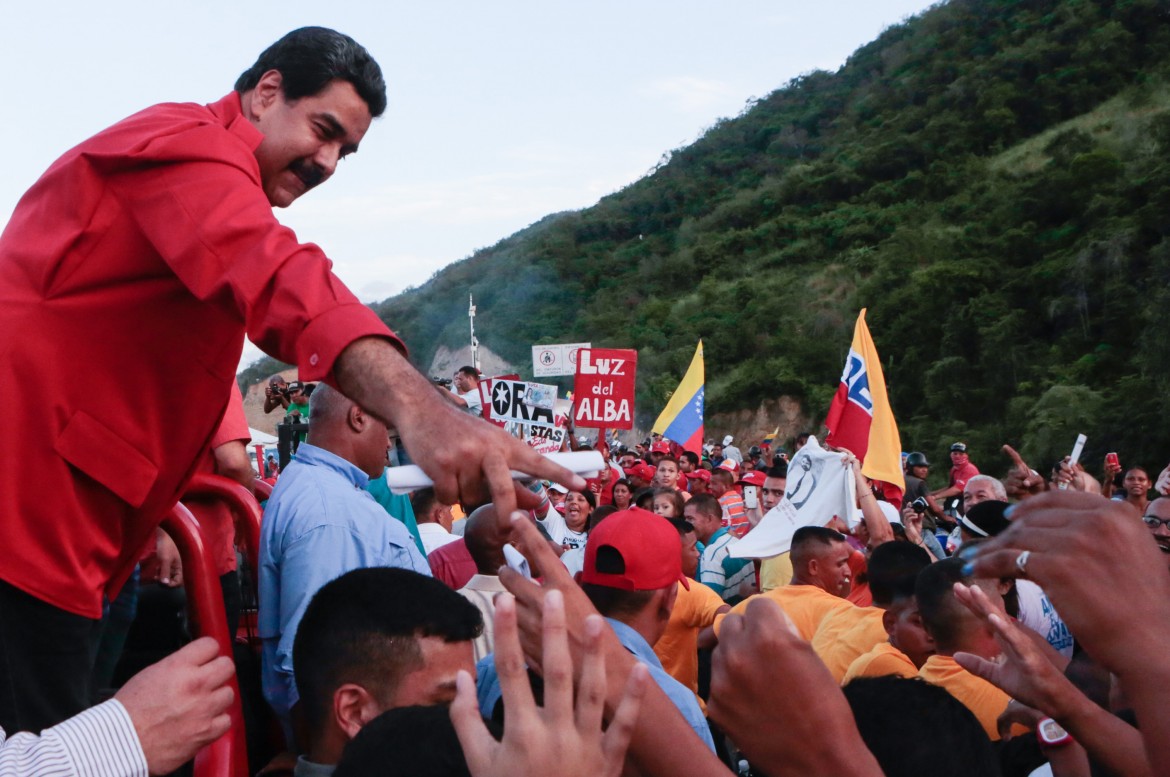Venezuela
Venezuelan elections: Maduro vs. the world
On Sunday, 19.5 million Venezuelans will decide whether to continue nearly two decades of Bolivarian socialism under Chavez’s successor.

“No Volveran!” They will not return, cried the Chavists in the streets of Venezuela yesterday as the election campaign drew to a close. The government supporters are preparing to contest in the polls a hodgepodge opposition that has waged a fierce campaign with strong in international backing.
“Change has arrived,” retort the candidates of the opposition Democratic Unity Roundtable (MUD) party, which was invigorated by the right-wing victory in Argentina. To celebrate, Buenos Aires Governor Mauricio Macri arrived here and joined on stage Lilian Tintori, wife of the leader of Voluntad Popular, Leopoldo López, who was controversially jailed for “instigating” the violence here last year that left 43 dead and over 800 injured.
On Sunday, 19,496,296 eligible voters — citizens abroad are excluded — will cast ballots for 167 members of parliament. The term of office is five years. In 2010, Chavists secured 59 percent of the chamber and 48 percent of the vote; the opposition earned 40 percent of parliament and 47 percent of the votes.
The socialist alliance has 98 seats (the three-fifths majority requires 99), and MUD has 65. Two members are independents, of the party Fatherland for All.
In 17 years of Bolivarian socialism, this is the 19th election. Chavism has lost only one — the constitutional referendum of 2007.
In the last few days, the electoral mechanisms were set up, and the opposition itself has declared them fraud-proof; it used them for its primary. To manipulate one of the 40,000 electronic voting machines, you would need three passwords, one of which is known only by the opposition.
Yet MUD refused to sign a commitment to respect the results of the vote. Their leadership, this time, is contesting the entire electoral system and the criteria for the allocation of seats that benefit the Chavists. Big cities shouldn’t count like small seats, says the right, waving international surveys and figures from the International Monetary Fund. MUD is preparing to disavow the results. Unless, of course, it wins.
Yesterday, the opposition refused to vote to fund the budget, pensions (recipients will still be paid for a few more months), a vast public housing plan and free school supplies, including computers, books and cafeteria food.
In addition to international observers already on the ground — including UNASUR and some former politicians, like Spain’s ex-Premier José Luis Rodríguez Zapatero — the right has called for 100 more, at the expense of taxpayers and without parliamentary authorization. The secretary general of the Organization of American States, Luis Almagro, had to reproach Pepe Mujica (the leftist ex-president of Uruguay) for his fiery statements against Chavist President Nicolás Maduro.
“No matter,” Maduro responded during his weekly, national radio and TV broadcast. “We welcome everyone. We are a country of peace and can be inspected.” With that, he ended his campaign on the historic Avenida Bolivar.
The right is taking advantage of the international situation (the economic recession, the collapse of oil prices and the return of the big powers to Latin America). They believe they’re closer to convening a recall referendum against Maduro, or mounting an “institutional coup” like the one the former Bishop-turned-President Fernando Lugo suffered in Paraguay, without discarding other quick solutions. The appeal for intervention from the “international community” is always loud and unrelenting, and relies on financial and PR support from Washington.
Locally, at least, international pressure hasn’t manifested in material ways. Brazilian President Dilma Rousseff rejected the Macri proposal for sanctions against Maduro: “MERCOSUR will not sanction Venezuela,” she said.
The Chavists have invented a strategy called “one for 10”: a signed commitment from every party member to get 10 people to vote. “We are a million people and one voice,” cried the red shirts as they revealed the results so far: At last count they had exceeded 6 million.
Sunday the polls will show whether the effort has paid off.
Originally published at on
